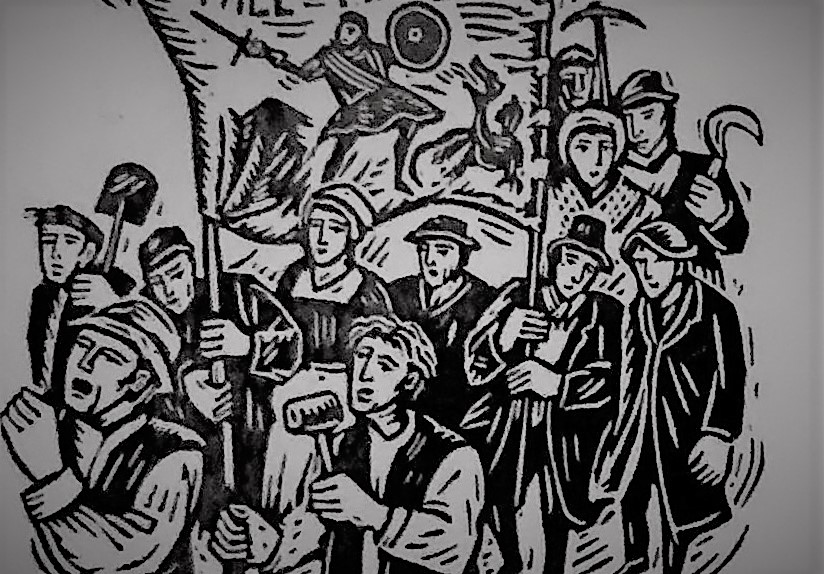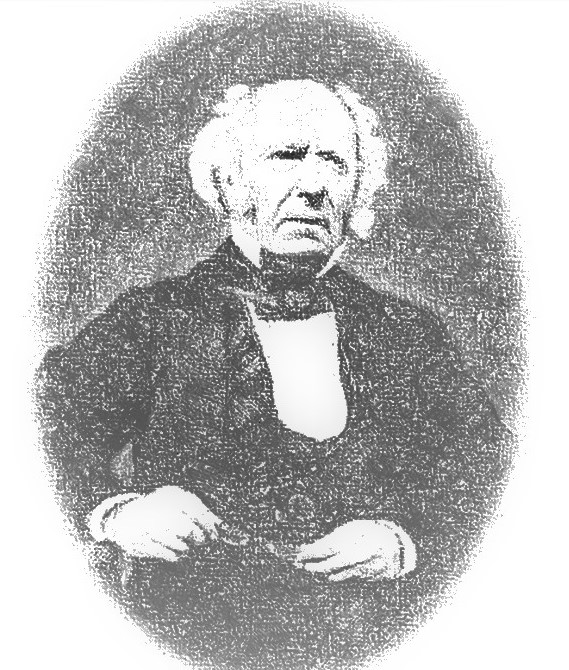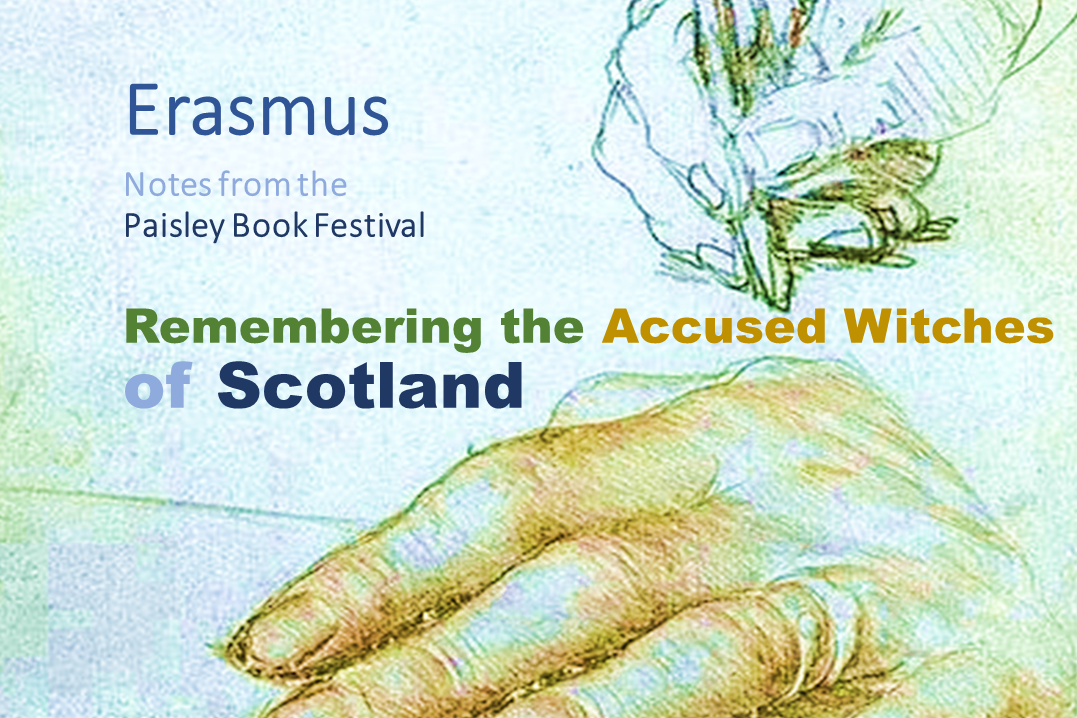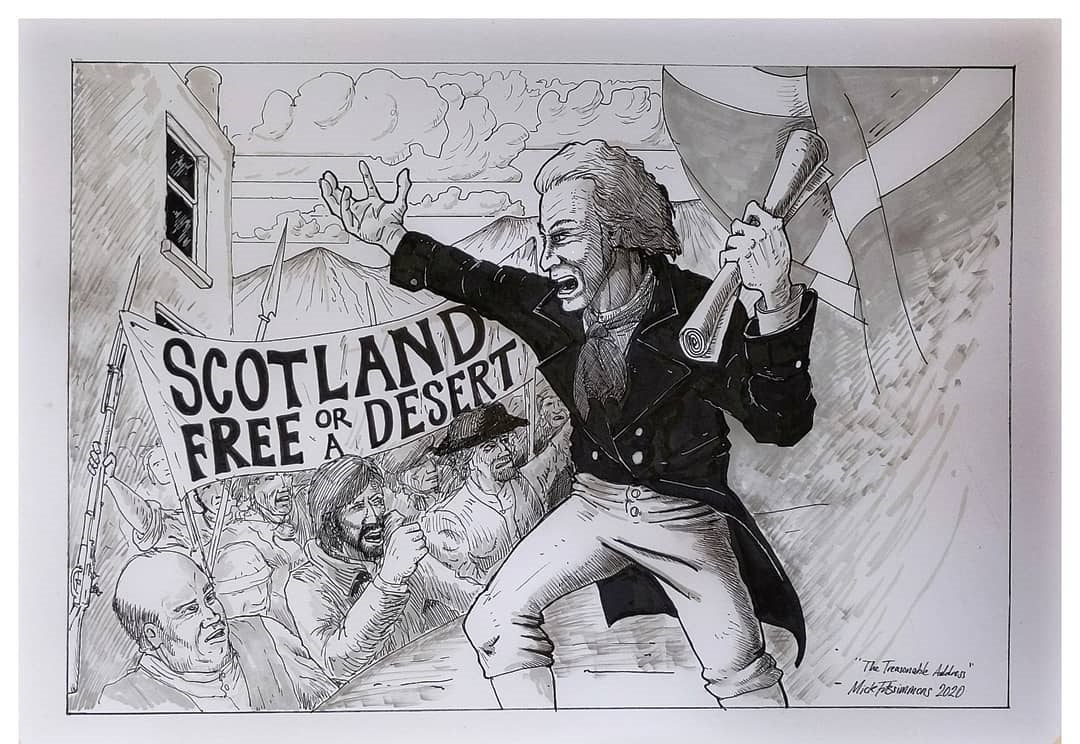
Chapter XIX
This is Chapter XIX of the serialisation, the wording reproduced exactly as it appeared in the Stirling Sentinel, on Tuesday 18th June 1889.
Living Witnesses of Baird and Hardie’s Execution – A Premature Burial in Milton Bog – The Porridge Post-Office – The Reform Agitation of 1832 – Apotheosis of Baird and Hardie’s Mother – Proposal for a Monument for the Martyrs’ Grave – Peter Mackenzie, The Originator of the Scheme – His Troubles and Triumphs
There are still alive in Stirling at least three persons who witnessed the execution of Baird and Hardie in 1820. Mr George Mouat, Royal Gardens, then a young man of seventeen, was standing near the mouth of the “Lang Close” in Broad Street; Mr W. Peddie, late bookseller, was also among the crowd; and Mr Leslie Neilson, printer, had a view from a lamp-post, which, boylike, he had climbed; but when the headsman appeared with his awful weapon, Leslie slipped down from his prominent position to avoid the sickening spectacle of decapitation. Another old gentleman, Mr W. Jenkins, George Street, was mixed up with the Radicals of St. Ninians, and it is said that either he or his brother James was placed in a box and buried for a time in Milton Bog in order to evade the strict search that was being made for enemies of the Government. Mr Adam Aikman, Cambusbarron, father of Mr A. Aikman, coalman, was a prominent Radical; and was among those imprisoned in Stirling Castle, along with Baird and Hardie,…Mr Aikman informs us of an ingenuous stratagem by which a correspondence was carried on from the outside with the prisoners in the Castle. The porridge supplied to them every morning was allowed to cool in bowls until the whole mass could be turned out, and this being done by an obliging servant, the letter was slipped into the bowl and the porridge replaced above it. The first thing Hardie and Baird did before beginning their breakfast, was to turn their bowl upside down and allow the porridge to slide out, when they could see whether there were any letters for them. There must also have been some plan by which replies to the letters could be smuggled out of the Castle, as it is clear from Hardie’s correspondence that the great bulk of it did not pass through the ordinary channels, and was not subjected to official supervision.
The Reform agitation of 1832 directed public attention to the events of 1820, and Baird and Hardie were frequently alluded to in the speeches and writings of the period as political martyrs who had sacrificed their lives for their principles. The Radical programme of 1832 was very similar to that for which these men had suffered, and as it became fashionable to pose as Reformers, there was a great deal of sympathy expressed for the sufferers, much of it by men who had taken good care not to open their mouths as long as there was any danger in doing so. Hardie’s poor old mother died on Wednesday, 6th June 1832, having lived long enough to see the cause for which her son had been judicially murdered, openly advocated on public platforms, none daring to interfere. It was insinuated by some of the opponents of Reform that Hardie’s mother had been suffered to die in penury and want, but this statement was promptly contradicted by her son, James Hardie, the fact being that Mrs Hardie all along had received assistance from a few genuine Reformers, and shortly before her death she received from Mr Mackenzie a sum of £11 out of the profits of the sale of Andrew Hardie’s letters, which Mr Mackenzie was then publishing in numbers at irregular intervals. This was sufficient to meet her humble wants, and after her death, the further profits of Mr Mackenzie’s publication were devoted to the erection of a monument to mark the grave of Baird and Hardie.
In characteristic fashion, Mr Mackenzie, who had many enemies only too ready to twist everything against him, and who insinuated that he was pocketing the proceeds of his publication of the letters, announced his intention in the Reformed Gazette, of which he was editor and proprietor, “The intention of the Editor,” he says, “in regard to the application of the future proceeds, which would have gone to Mrs Hardie, had she survived, is this:- he proposes that they should be appropriated to the erection of a small monument to Hardie and Baird, and that Mr McLaren, the highly talented and respectable Editor of the Scotsman newspaper, at Edinburgh, should be requested, along with two other gentlemen, whom the Editor will take leave to name next week, to act as trustees in regard to it. Therefore, every person purchasing these letters, &c., will understand that they are contributing their mite for the above purpose. And the Editor fervently hopes that in a very short while, his very enemies, pitiful as he regards many of them, will be constrained to acknowledge that mainly through his exertions was this monument erected. For, if Providence spares him in life, it will be erected, and that soon!”

As showing the virulence with which Mr Mackenzie was attacked, and the vigorous way in which he defended himself, we may give here, especially as it is connected with our subject, the paragraph which precedes the one we have quoted above, “The Seventh No, [i.e. ‘Hardie and Baird’s Letters – Spy System, &c.’] is ready this morning. ‘An atrocious accusation made in a low penny publication [the Reformed Gazette was twopence!] last week, that the Editor had purloined the information relating to these matters from the late Robert MacDougal, of the Scotsman Office, at Edinburgh, is, he can assure his readers, utterly destitute of foundation. Behold how easily and completely the Editor can vindicate himself and cover his enemies with shame and confusion. This accusation against him rested on the authority of two letters said to have been written and subscribed by Daniel Paterson and W. Gardner, connected with the Glasgow Chronicle Office. Now the Editor holds in his possession a letter received by him from Mr Prentice, the Editor of the Glasgow Chronicle, distinctly stating, ‘that there is no man of the name of Daniel Paterson in the Chronicle Office,’ and next, the Editor holds in his possession a letter from Mr W. Gardner, of the Chronicle Office, distinctly disclaiming and denying that he was the author of the letter in the publication referred to. Moreover, the Editor has evidence from Mrs Macdougal, that the other parts of the statement in that penny publication were atrociously false, and she repels them with indignation. Therefore, the worthless wretch who could invent such falsehoods, and the men who could encourage him in so doing, all for the purpose of running down the Editor of this paper, if they can, but that, thank God, is out of their power, are fitter for pity than the halter. A few additional words from us could drive them out of society, but we prefer to leave them to their own meditations.”
In the issue of the Reformers’ Gazette for 30th June 1832, the Editor reports progress in regard to the monument scheme. “We propose that James Turner, Esq. of Thrushgreen, and James Wallace, Esq., treasurer of the Glasgow Political Union, act as co-trustees in Glasgow. Are our readers satisfied? Then we propose to take in Plans and Estimates for the erection of the monument to Baird and Hardie at Stirling, where their mortal remains are deposited. The ground is already secured. [Here Mr Mackenzie was assuming too much, as will afterwards appear.] Our anxious desire is to have the monument erected on or before the 8th of September next, the day on which they suffered; and that on that day there should be a Public Procession, and perhaps a public dinner on the completion of the monument. But we are, of course, ready to consult the wishes of a majority of our readers in this respect and shall feel obliged to any of them for their suggestions. We think that we shall be able, by our own exertions, to raise at least Fifty or Sixty Pounds for the monument. This is not bad for humble folks like us. Nay, we think it is rather more than the Boroughmongers have been able to do for any of their dead friends for a long while back. And since we have begun the business in the way we have done, we trust we shall be permitted to go on with it to the end, without being trammelled or annoyed by any envious, petulant, or exceptional feeling in any quarter. For although the whole matter might be left entirely to our discretion, we protest that only one object could actuate us, viz., a sincere desire to have the business honestly and properly done. We shall have an advertisement in the newspapers – to contractors, &c. – next week, and we shall probably give a few words of additional explanation next Saturday.”
To be continued…






